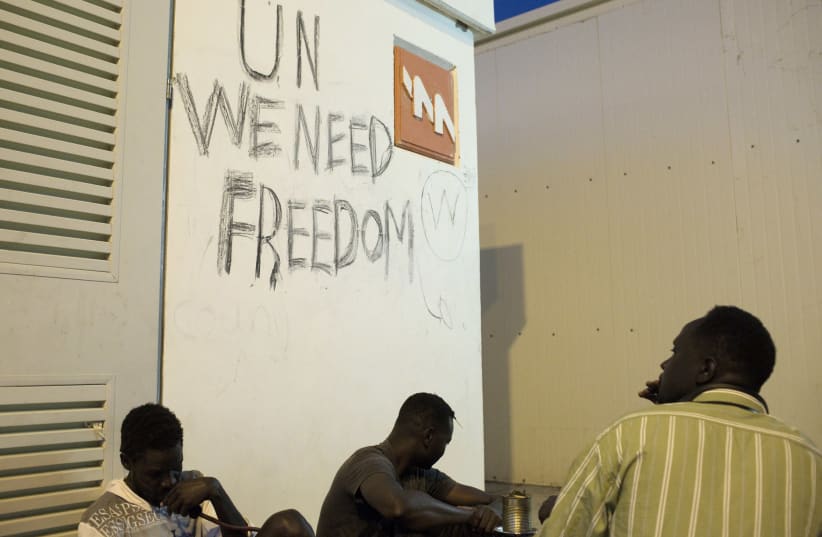It is time to increase the pace of deporting African migrants, Prime Minister Benjamin Netanyahu told the cabinet on Sunday.Netanyahu said he has a three-pronged policy regarding getting migrants to leave the country, with the current focus being to encourage most of them to self-deport to a third country – which reports have identified as Rwanda.In the years leading up to 2012, a flood of African migrants crossed into Israel illegally, at one point reaching around 64,000.Netanyahu said that the state had already carried out the first two prongs of its strategy: stopping the flow of new migrants by building a wall and through legislation, as well as getting more than 20,000 migrants to leave.The third stage of deporting migrants at an increased pace, he said, “can be carried out thanks to an international agreement which I obtained which allows us to deport the 40,000 remaining infiltrators against their will.”“This is very important. This will allow us to empty the Holot Detention Center in the future and to redirect portions of the large resources we are using there,” from guarding the migrants, to other needs of the state.Netanyahu was discussing an initiative announced last week by Public Security Minister Gilad Erdan and Interior Minister Arye Deri to close Holot, an “open” detention center where a few thousand migrants have been sent to try to convince them to self-deport.Erdan and Deri’s idea would be to offer migrants the choice of “voluntarily” deporting to a third country or being put in regular prison indefinitely.Several organizations, including The Hotline for Refugees and Migrants, the Association for Civil Rights in Israel, Amnesty International Israel, Kav LaOved, Physicians for Human Rights – Israel, Aid Organization for Refugees and Asylum Seekers, and the African Refugee Development Center responded to Netanyahu, Erdan and Deri by slamming the initiative.They accused the government of violating its international obligations and of using incitement against migrants.
Stay updated with the latest news!
Subscribe to The Jerusalem Post Newsletter
“The Holot detention center, an isolated prison that was meant to make asylum seekers’ lives miserable, should have been forbidden in the first place. From the words of Minister Erdan it is clear that the government was lying to the High Court when they denied that the purpose of Holot was to make asylum seekers leave Israel,” they said.“Holot needs to be shut down immediately,” they continued, “and instead of a policy of oppression, lies to the High Court, detention and deportation, the government should fulfill the moral and legal obligations of Israel to protect asylum seekers and ensure their right to live in dignity.”Until now, Israel was only allowed to deport migrants to third countries if they agreed to self-deportation and were not viewed as being coerced.However, in August, the High Court of Justice both struck down a tougher state policy against migrants and implied that if the state managed to get a third country to accept migrants and passed a new law to exploit such a deal, then deportation of migrants against their will could become legal.The High Court distinguished between deporting migrants to a third country, such as Rwanda, and to the migrants’ country of origin.Israel is a signatory to the Convention on Refugees which prevents it and other signatories from deporting illegal migrants back to their countries of origin if they would face persecution.There is an ongoing debate about whether Eritreans, Israel’s largest group of migrants, fled Eritrea due to persecution or to improve their economic status.Deporting to a third country sidesteps this legal debate.It is unclear, however, if the High Court would endorse indefinite detention in a regular prison as an alternative to self-deportation.The High Court has said that one of the reasons that it declared the old state policy unconstitutional was because the state was trying to coerce migrants to self-deport at the same time as having signed a deal with the third country that migrants would only be sent voluntarily. However, it did not explain how far the state could go to “convince” migrants to be deported.UNHCR, the UN Refugee Agency expressed concern over the proposal."Due to the secrecy surrounding this policy and the lack of transparency concerning its implementation, it has been very difficult for UNHCR to follow up and systematically monitor the situation of people relocated to these African countries. UNHCR, however, is concerned that these persons have not found adequate safety or a durable solution to their plight and that many have subsequently attempted dangerous onward movements within Africa or to Europe," the agency said in a statement.“As party to the 1951 Refugee Convention, Israel has legal obligations to protect refugees and other persons in need of international protection,” said UNHCR’s Assistant High Commissioner for Protection, Volker Türk. “UNHCR and the international community have been assisting Israel to meet its international obligations, including by resettling or finding other durable solutions for 2,400 refugees who have departed from Israel in the last couple of years.”Meanwhile, also on Sunday, the High Court ruled that the state’s policy restricting migrants from bringing most packaged food products into the Holot detention center was unconstitutional.The High Court did however endorse the state’s policy of preventing migrants from cooking within the facility.Regarding packaged products, the court wrote that the state had said it had restricted packaged foods because it believed that a packaged can of tuna had caused an outbreak of some kind of illness.The court asked rhetorically, “Because of one bad can of tuna, does the whole prison need to be penalized?” It suggested that the state could make some targeted restrictions that had a rational basis, but had to start from the standpoint that most items should be permitted since the migrants in Holot are not categorized as criminals.However, the decision does not go into effect for 90 days, which, taken with the new initiative to close the facility, leaves it unclear as to whether it will ever be implemented.
